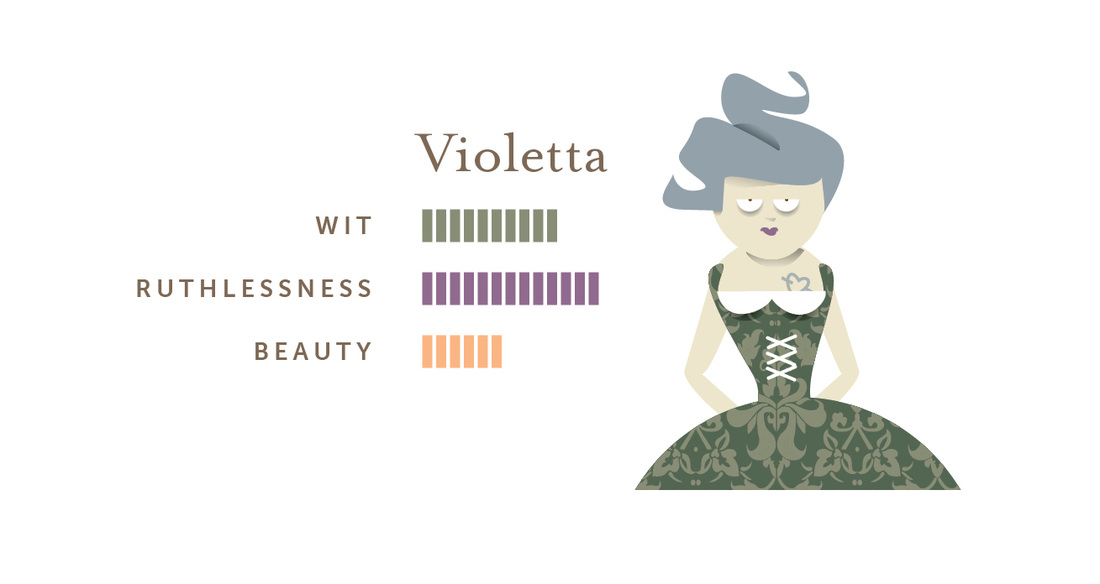|
At it’s heart, Austen Translation is about relationships and we’ve been spending a lot of time lately thinking about and talking about the “opacity of romantic love.” I mean, you sit there across a tiny little table with a tiny little candle in between you and your date, and you’re trying to remember to smile and you’re trying to work in that charming polo pony story that paints you in good light, and you’re trying to remember to ask questions and you really don’t know anything for sure about what the other person is *actually* thinking. And that uncertainty, love it or hate it, is what gives dating its edge, its energy and its risk. Now we like to think of Austen Translation as a dating sim with a razor-sharp edge, a mercenary dating experience, a full-contact-sport type of literary adventure. But we also want to preserve the suspense of not quite knowing where you stand at any giving time during the play of the game. So then the question becomes: how do you give the player feedback so that they’re making meaningful decisions based on *something* without giving it all away in a text box that says “Commander Squinchly is obviously smitten with you.” Where’s the information density sweet spot? AT is played in a series of rounds, most of which are social events at which the player gets to choose an action which influences how the bachelors and the other women vying for the suitors’ attentions feel about the player. The player and the other women each have a set of stats that determines the suitors’ opinion of them, and players try to make decisions each round to improve (or tamp down) their stats and thus their attractiveness to their chosen suitor. The player can see their own stats and the stats of the other competitors, but they’re not told outright what the suitors are looking for. Now, we’re not big on the whole “floating stats” idea, which is too often a lazy way to avoid any interpretation or storytelling, so we want to keep that hard math information delivery method down to a bare minimum. One information delivery mechanic we talked about early on was social cueing. Very Austenian. When the player takes an action the other competitors’ facial expressions and the facial expressions and body language of the suitors would shift to cue the player in to what the various other characters thought of that choice. Of course, in real game time, reading and interpreting and remembering the reactions of seven characters on the screen might be a bit of a challenge, particularly when you think about playing the game on a smaller screen, like a phone. So that’s a nice idea, and thematically appropriate, but it’s probably not going to be enough.
Then, of course, there are the Deus Ex Machina type of information drops. Your maiden aunt pops in to give you a bit of matronly advice. You happen to stumble across Ambassador Dashing’s journal left behind on a carriage seat. A freak rainstorm strands you and your beau beneath an umbrella and you happen to have a few minutes of time alone to flirt and see if there’s any chemistry. The interesting thing with this kind of information delivery would be to think about how reliable these sources of feedback should/need to be. And how many of them we need. Are they cutscenes between each event? Every other? Randomly sprinkled? Another feature we’re planning to incorporate is the “unexpected plot twist” about 75% of the way through a round. It would be a stand-alone scene where the player finds out a detail that changes the round. Her beau is actually her long-lost brother, or there’s a hot new girl who just moved to town. Something which shakes up the solidifying state of play. And while this will probably be a little more expository and a little blunter than some of the other feedback methods we’re talking about above, it would also shape the player’s choices and provide information for the player to base decisions on. Like many gameplay mechanics issues, this one will probably be resolved through play testing and iterations to get the balance and sequencing right. The next step may be an evening of wine and paper playthroughs with a test group to see what works and what doesn’t. Maybe even some veggie chili with sausage. Stay tuned for photos and conclusions.
0 Comments
|
AUTHORWorthing and Moncrieff, LLC is an independent developer of video game stories founded in 2015. ARCHIVES
December 2022
|

 RSS Feed
RSS Feed
